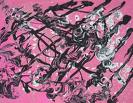- JPB-UG-1a: Building a Virtual Interactive Whiteboard (James Foster)
- JPB-UG-1b: Building a Virtual Interactive Whiteboard (Jin Seo)
- JPB-UG-234: Acoustic Geo-Sensing
- JPB-UG-5: Acoustic Scene Classification Challenge (Hao Huang)
- JPB-UG-6: Acoustic Event Detection Challenge
JPB-UG-1a: Building a Virtual Interactive Whiteboard
JPB-UG-1b: Building a Virtual Interactive Whiteboard



Description
This project will use the combination of an mico-projector and USB video camera to build a portable interactive whiteboard. The concept is quite straightforward: the `whiteboard’ content is stored on the computer and projected onto a surface. The video camera then tracks the user’s interaction with surface and the computer updates the whiteboard content according to the application that is being run. The challenging part is programming the computer vision system to allow for robust interactions. To simplify the problem the first version of the system could require the user to use a prop such a pointer or a coloured glove.
Requirements
- Experience with (or willingness to learn) C++ or C#.
JPB-UG-234: Acoustic Geo-Sensing



Description
Available for up to three students.
Acoustic Geo-Sensing deals with the connection of acoustics and geoposition, i.e. what does a particular geographical position sound like? Recently the Techincal Universty of Graz has released the Graz Cell-phone Cycle Corpus which has 16 hours of audio captured from GPS-tracked cylcle trips and which is available for research in this area. Many different problems can be posed using this data. For example, is it possible to determine a cyclists route through a city using evidence from the audio signal alone? This project is available for a group of up to three students each of whom would work on a different Geo-Sensing problem using the same data set. There would also be potential for capturing new Geo-Sensing data based on walking routes through Sheffield using wearable microphones. The specifics of this project are being left deliberately open-ended and will be pinned down later depending on the number of students in the group and their respective interests.
Requirements
- An interest in pattern classification (e.g. COM2004); programming skills
JPB-UG-5: Acoustic Scene Classification Challenge



Description
Consider the problem of taking an audio recording and trying to tell where it has been made. For example, is it indoors or outdoors? Is it in a recording from a city street or from a country park? Is it a supermarket or a restaurant? This task is know as ‘acoustic scene classification’. Humans find it very easy but it is very difficult to produce automatic systems that operate reliably. However, it is an important task as it occurs as a component in many larger applications.
This project will attempt to build an acoustic scene classification system that will be evaluated using data from the recent D-CASE scene classification challenge described here, The D-CASE Challenge
Requirements
- An interest in pattern classification (e.g. COM2004); programming skills.
JPB-UG-6: Acoustic Event Detection Challenge



Description
Consider the problem of listening an audio file and trying to detect the occurrence of a specific sound event within it. For example, the task might be to detect all occurrence of doors slamming, or of people laughing, or of telephones ringing. This task is known as acoustic event detection. Humans are incredibly good at this but it is extremely hard to produce automatic systems can come close to Human levels of performance. However, solutions to this problem would be incredible useful in a huge range of applications.
This project will attempt to build an acoustic event detector for a range of commonly occurring sounds following the specification of the recent D-CASE acoustic event detection challenge described here, The D-CASE Challenge
Requirements
- An interest in pattern classification (e.g. COM2004); programming skills.